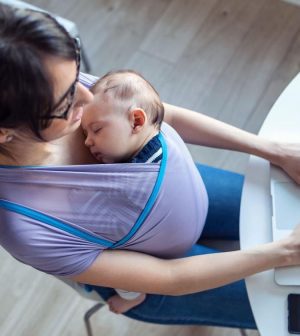- Could Your Grocery Store Meat Be Causing Recurring UTIs?
- Are You Making This Expensive Thermostat Error This Winter?
- Recognizing the Signs of Hypothyroidism
- 10 Strategies to Overcome Insomnia
- Could Artificial Sweeteners Be Aging the Brain Faster?
- Techniques for Soothing Your Nervous System
- Does the Water in Your House Smell Funny? Here’s Why
- Can a Daily Dose of Apple Cider Vinegar Actually Aid Weight Loss?
- 6 Health Beverages That Can Actually Spike Your Blood Sugar
- Treatment Options for Social Anxiety Disorder
COVID Shot in Pregnancy Helps Baby, Even If Mom’s Been Infected: Study

Pregnant women who get COVID-19 and then get vaccinated before giving birth are more likely than other moms to pass protective antibodies to their newborns, new research shows.
Babies can’t get their own shots until they’re 6 months of age.
For this study, a team at the University of California, Los Angeles (UCLA), studied both vaccinated and unvaccinated moms.
At birth, 78% of their babies had detectable antibodies to SARS-CoV-2.
That included all of the babies born to vaccinated moms and about three out of four whose mothers were unvaccinated.
“Several studies have demonstrated that mothers with a history of COVID during pregnancy may pass antibodies to their babies at delivery,” said lead author Dr. Mary Cambou, clinical instructor in the UCLA Division of Infectious Diseases. “However, our study was able to examine several factors, including timing, the severity of COVID disease and subsequent vaccination, on both maternal and infant levels at birth and at 6 months.”
Even at 6 months of age, 52% of all babies in the study carried COVID-19 antibodies.
The researchers attributed the dropoff to a combination of factors: Infants of vaccinated mothers had more antibodies at birth than those born to unvaccinated mothers and detectable antibodies wane over time.
For the study, the researchers collected blood samples from 148 women and 122 newborns at birth. At six months, another 45 samples were collected from moms and 48 from babies. Accounting for the discrepancy in numbers, researchers noted that some participants had dropped out, and some mothers had given birth to twins and triplets.
The investigators concluded that even if women had COVID-19 during pregnancy, vaccinating them as well may be an effective strategy to boost their antibodies and also those in infants too young for their own shots.
“Vaccination following infection and prior to delivery was the strongest predictor of infant antibodies at birth,” Cambou said in a university news release. “Notably, infant levels dropped significantly by 6 months, emphasizing the importance of starting the COVID vaccine series as early as 6 months.”
The report was published online recently in The Journal of Infectious Diseases.
More information
The U.S. Centers for Disease Control and Prevention has more on COVID-19 vaccines.
SOURCE: University of California, Los Angeles, news release, Sept. 22, 2022
Source: HealthDay
Copyright © 2026 HealthDay. All rights reserved.










